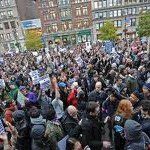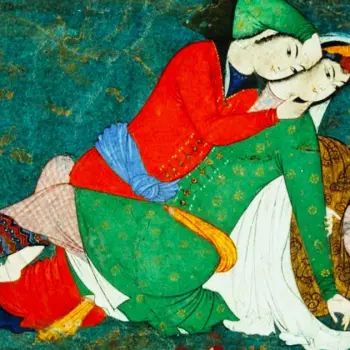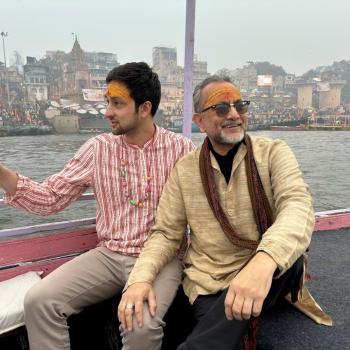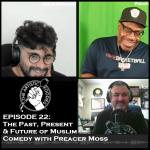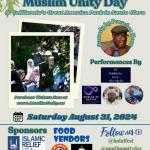 |
|
The revolution will be tweeted
|
Sometimes it seems Muslims can’t get a break, and 2011 was no exception. The “creeping sharia” paranoia in the US continued unabated (despite any evidence that there is any real threat of sharia law supplanting the Constitution) with the passage and/or introduction of anti-sharia legislation in over 20 states, and alleged threats posed by Muslim Americans were brought up at nearly every Republican debate this year. But step back a bit and you’ll see that Muslims in America as generally feeling more hopeful than ever, and the wave of people power that washed over the Middle East has inspired Muslims all over the world to take control of their destiny, whether it be political, social, or cultural. So in that spirit, and continuing in our decade-long tradition, we present to you the top ten “good news” stories of 2011. (See altmuslim’s “Top Ten” lists for 2010, 2009, 2008, 2007, 2006, 2005, 2004, 2003, and 2002.)
1. People power wins out in the Arab world
In the end, a simple slap in the face was enough to ignite a popular revolution that engulfed nearly the entire Arab world. The revolutions that followed in early 2011 – Tunisia, Egypt, Yemen, Libya, Syria, Bahrain, and likely more to come – proved that massive peaceful resistance was sufficient to topple the paper tigers that had ruled with an iron fist for decades. More significantly, the will of the people expressed in the streets was a direct challenge to al-Qaeda and other extremists who believe that violence and terrorism were the only way forward. While there is still much uncertainty regarding the eventual outcome – Tunisia has successfully seated a transitional government, Egypt’s democratic transition is sputtering, and blood is still being shed in Syria and Yemen – the masses are keeping the pressure on the powers-that-be to ensure that the world knows that the people are in charge, and will never again settle for anything less.
2. Brutal dictators fall like dominoes after decades in power
Time Magazine declared 2011 to be the Year of the Protestor, but an equally powerful, results-based assessment might be that 2011 was the Year that Dictators Fell. The revolutions that swept through most of the Arab and Muslim World were a testament to the power of the people to bring down dictators who had ruled kingdoms of power, corruption and oppression for decades. In Tunisia, vegetable vendor Mohamed Bouazizi, fed up with being pushed around by the government, lit himself on fire in protest on Dec. 17, 2010, leading to a dramatic upsurge of social and political unrest as Tunisia awoke to its brutal reality under President Zine El Abidine Ben Ali. A mere 28 days later, on January 14, 2011, Ben Ali officially resigned after fleeing to Saudi Arabia. Arab countries took note of their Tunisian brothers and sisters, and the Egyptian revolution was soon underway, with Tahrir Square at the heart of the protest. Eventually, longtime president Hosni Mubarak also resigned under pressure. Protests erupted into a full-scale bloody civil war in Libya, leading to the ousting of dictator Muammar Gaddafi, after 42 years of power. Leaders in other Arab countries are also teetering on the edge, as Syria, Yemen, Bahrain – among others – continue to be engulfed by people-driven protests brought on by years of high unemployment, corruption, a lack of basic freedoms and poor living conditions.
3. The bin Laden albatross comes off our necks
For much of the decade after the 9/11 attacks, Osama bin Laden personified the fear that many had of the Muslims around them. The longer he and his associates managed to avoid being brought to justice, the longer the wounds of that fateful day remained unhealed. To everyone’s relief – especially those Muslims who bore the brunt of the outcry against his actions – the man who dragged a billion and a half people down with him was killed in a daring raid on his Abbottabad, Pakistan hideout, announced by President Obama in the hours after its successful completion, and Muslims joined others in the impromptu celebrations in New York and Washington. While the fight against extremism is far from over, the killing of bin Laden shifts it into a new phase, one in which more of the world hopefully sees it as a fight between good and evil rather than between Muslims and others.
4. The world is introduced to some “All-American Muslims”
A year ago, Katie Couric famously opined that there needed to be a Muslim version of the Cosby show. Nearly a year later in November 2011, the reality show All-American Muslim debuted on TLC, bringing the lives of five interconnected Lebanese-American families in Dearborn, Michigan into living rooms across America. While the show generated some controversy – first from some Muslims who complained that the show was not representative of the diversity of Muslim-Americans, and then more publicly when the one-man Florida Family Association succeeded in getting retailer Lowe’s to pull ads from the show – it did manage to get a detailed look at Muslim life in America into the homes of millions who may have never had the opportunity to know their Muslim neighbors.
5. Sunlight hits the Islamophobia industry
For a decade or more, various organizations with a vested interest in marginalizing Muslims have operated in near-secrecy, mobilizing unwitting Internet users, politicians looking for a way to animate the electorate, and generating content that paint a picture of a “fifth column” of Muslim “stealth jihadists” that seek to take over America. While there may once have been a time where this could be laughed off as fringe, in recent years this loose network has made a devastating impact on the public square. Enter the Center for American Progress’ “Fear, Inc.” report, which was co-authored by playwright/lawyer Wajahat Ali (an associate editor here at altmuslim) along with CAP mainstays Matt Duss, Faiz Shakir, and Eli Clifton. This comprehensive report finally cast sunshine on a profitable industry of hate (drawing a hostile response from those named in it) and has started conversations about the foundations of the industry, the intent of those working to support it, and the need to protect the Constitutional rights of Muslims in the wake of it.
6. An Arab Muslim woman wins the Nobel peace prize
As protests in Yemen erupted in early 2011 after Tunisia saw the fall of President Ben Ali, journalist Tawakul Karman saw a major opportunity for the Yemini people and began to use her work and her voice to call upon the people of Yemen to support the “Jasmine Revolution,” a term she used to refer to the Arab Spring. During the protests, Karman organized student rallies, calling for the resignation of Yemen’s president Ali Abdullah Saleh. On Jan 22, she was stopped and taken to prison by three men without police identification, which became a turning point in the protests, as demonstrations erupted in reaction to her detainment. She called for a “Day of Rage” on February 3, similar to the January 25 “Day of Rage” in Egypt’s Tahrir Square. Karman continued to organize protests and rallies, sometimes clashing with fellow protestors. And throughout her on-the-ground work in Yemen, she reported on the revolution, giving interviews and writing a piece for the New York Times, calling out Saudi Arabia and the United States for their support of Saleh. For her work, Karman, along with Liberia’s Ellen Johnson Sirleaf and Leymah Gbowee were awarded the Nobel Peace Prize “for their non-violent struggle for the safety of women and for women’s rights to full participation in peace-building work,” proving that women “with stuff on their heads” can move mountains.
7. A new window opens into Muslim heritage
It was a tricky proposition for the New York Metropolitan Museum of Art to build one of the world’s largest and most comprehensive collections of art from Muslim history. It was even more challenging to accomplish this in New York a short distance from Ground Zero. It complicates matters even further to complete the work and open the new wing shortly after the 10th anniversary of 9/11. But the reopening of the Met’s Islamic wing – whose formal name is the “Galleries for the Art of the Arab Lands, Turkey, Iran, Central Asia and Later South Asia” – was an unparallelled success that drew rave reviews and none of the protests that some expected. Like the protests against the Park51 community center in lower Manhattan that fizzled once the bridge-and-tunnel crowd left, it once again shows that New Yorkers know how to separate reaction to terror attacks from the inclusion of a Muslim New Yorker population that nears 10%.
8. Saudi women take the wheel
It’s a seemingly innocuous concept – the existence of women drivers. But in Saudi Arabia, the fight to allow women the right to drive took center stage in 2011, garnering a driving protest by Saudi women, detainment for some Saudi female drivers, a blog dedicated to the fight, and even a report from a “well-known [Saudi] conservative academic” who warned female drivers would mean the “end of virginity.” The protest started when Manal al-Sharif posted a video of herself driving on YouTube, causing her and her brother to be detained, since she was in violation of a Saudi ban on women drivers. This led to an organized campaign by Saudi women to gain their right to drive, starting with a Facebook protest calling for women to drive on June 17th. The fight continues, as Saudi women take to the wheel and continue to protest for their right to drive. As al-Sharif said in an interview, “I’m doing [this] because I’m frustrated, angry and mad. It’s 2011, and we’re still discussing this insignificant right for women.” The ban has yet to be lifted, and Saudi women continue to fight, though they face mixed signals of support from The Kingdom. King Abdullah pledged to give Saudi women more political power in the coming years, but new Crown Prince Nayef bin Abdel-Aziz Al Saud, according to an NPR article, is known for his opposition to women’s rights.
9. Bringing imams into the fight against domestic violence
She had heard about its success in Muslim Mindanao province in the Philippines, when a speaker presented a case study at the 2009 Women’s Islamic Initiative in Spirituality and Equality (WISE) conference on the success of training gender-sensitive imams and religious leaders. This was what Afghanistan needed, thought Jamila Afghani. And so she went back to her country, contacted WISE (a program of the American Society for Muslim Advancement), and asked for help to start an imam gender-sensitive training program at the Noor Educational Center (NEC) in Kabul, where she had dedicated her life to empowering women in Afghanistan. She helped set a program to educate imams on women’s rights through Friday khutbahs and media appearances. The program has been in effect for a few years, with appointed monitors who sit in and listen to the sermons to make sure the training has been effective. According to Afghani, the program has reached 9.5 million people in Afghanistan. Although this story wasn’t exclusive to 2011 nor widely covered by the world media, the presentation of this program at the 2011 WISE conference in Istanbul was a turning point for the women leaders, activists, humanitarians, and journalists who had gathered to learn from each other’s work. Imam Mawlana Ehsan Saiqal, who had traveled with Afghani to the conference to talk about the program, told a story of one of his congregants who came to him after a Friday khutbah in tears, saying that he never knew Islam actually advocated for women’s inheritance, marital and property rights, adding that he regretted the decisions he had made for his daughters.
10. Muslims remember 10 years after 9/11 in a variety of ways
The 9/11 attacks took everyone, including Muslims, by surprise, but by the time the 10th anniversary of the devastating attacks came around, Muslim communities across America were ready. Thousands of Muslim-led service projects were planned for the day of 9/11 in response to President Obama’s call for public service, including blood drives, interfaith commemorations, and volunteering for local charities. Muslims paused to remember 9/11 heroes such as Mohammad Salman Hamdani, an EMT raised in New York who selflessly rushed into the towers to save lives, and ended up giving his own. Even the Park51 community center in lower Manhattan, which was the focus of so much protest in 2010, opened its doors with a photo exhibit featuring New York children (and thankfully no protests). 9/11 defined a whole generation of Muslims in America who are now determined to make public service and integration into American society one of the hallmarks of their identity. With the US winding down in Iraq (and soon Afghanistan) as well as the demise of bin Laden, Muslim Americans look forward to being remembered more for what they do for society rather than what a small group of terrorists did so long ago.
Dilshad Ali is the incoming editor-in-chief of altmuslim.com and the managing editor of the Muslim portal at Patheos. Photo credit: Ghazala Irshad via flickr.


